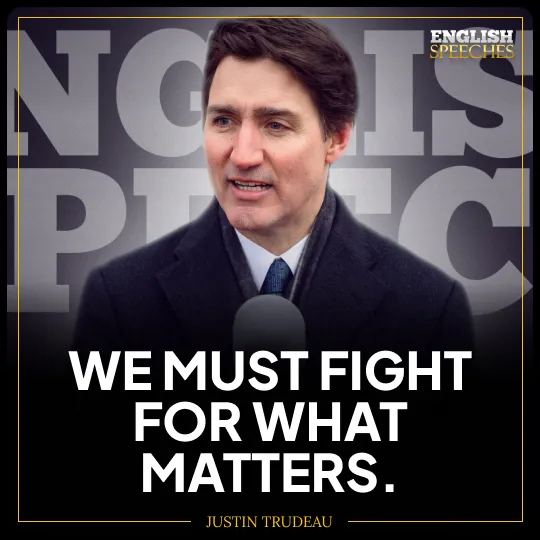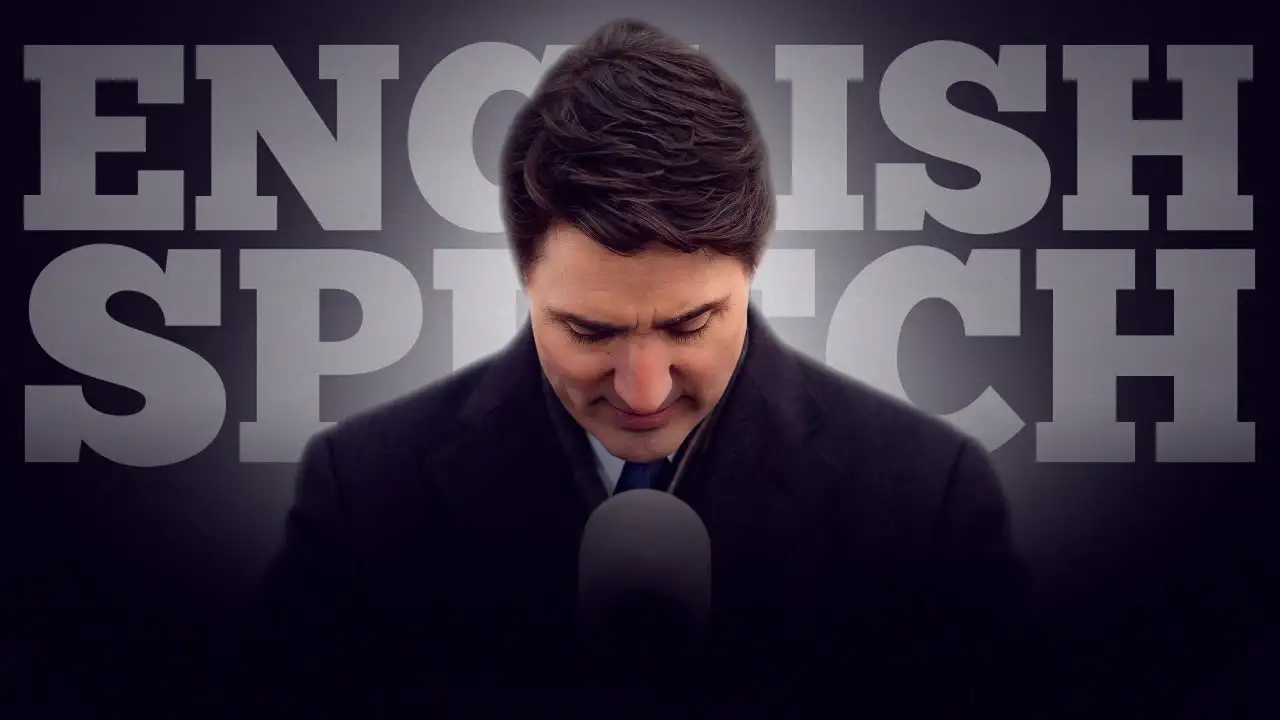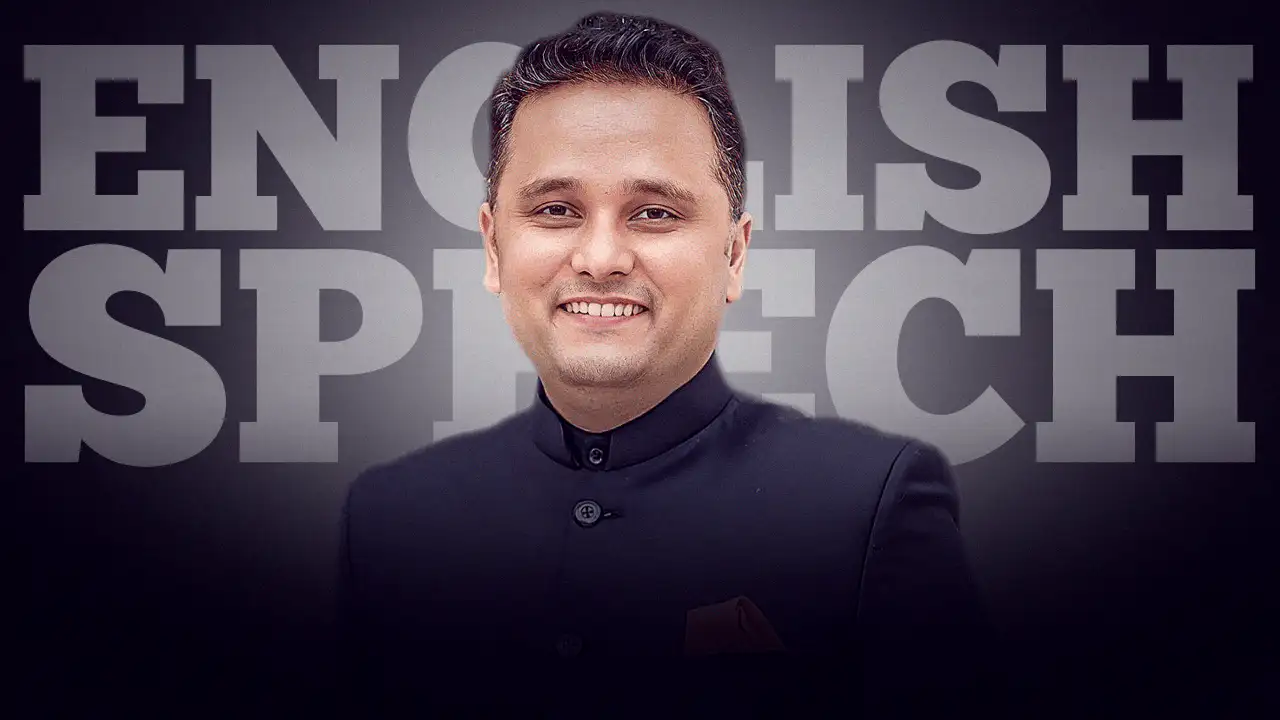Justin Trudeau’s heartfelt speech announcing his resignation as Prime Minister reflects his journey of leadership, resilience, and dedication to Canadians. Serving as Prime Minister since 2015, Trudeau shares his reflections on advancing reconciliation, addressing climate change, and strengthening Canada’s middle class. His decision underscores his commitment to Canada’s best interests and his belief in offering Canadians a fresh choice for the future.
Leadership Through Challenging Times
Vocabulary Highlight:
- Resilience (noun): The ability to recover from difficulties and adapt to change.
- Pronunciation Tip: /rɪˈzɪliəns/
- Example: “Trudeau admired the resilience of Canadians through the pandemic.”
- Reconciliation (noun): The act of restoring friendly relations.
- Example: “He prioritized reconciliation with Indigenous communities during his tenure.”
Grammar Focus: Using Conditional Sentences
- Example from Text: “If I have one regret, it’s not being able to reform our electoral system.”
- Explanation: Conditional sentences express a cause-and-effect relationship.
- First Conditional: “If + present tense, will + base verb”
- Example: “If Canada works together, it will achieve great progress.”
Simplified Explanation:
In the sentence, “If I have one regret…,” the condition (“I have one regret”) leads to the result (“not being able to reform our electoral system”), emphasizing a missed opportunity.
Key Themes from Justin Trudeau’s Speech
- Commitment to Canadians:
- Definition: A strong dedication to serving the country and its people.
- Example: “Trudeau’s policies were driven by his commitment to Canada’s middle class.”
- Challenges of Leadership:
- Definition: Navigating obstacles while leading a nation.
- Example: “He acknowledged the difficulties of leading a minority government.”
- Fighting Polarization:
- Definition: Reducing divisions within society or politics.
- Example: “Trudeau hoped his resignation would lower the political temperature.”
- Advocating for Climate Action:
- Definition: Promoting initiatives to combat climate change.
- Example: “Trudeau emphasized the importance of continuing the fight against climate change.”
- The Importance of Unity:
- Definition: Encouraging collaboration and shared goals.
- Example: “He called for Canadians to find common ground for the country’s benefit.”
Trudeau’s speech illustrates the resilience and dedication required to lead a country while addressing complex global challenges.
Key Lessons and Vocabulary
Vocabulary Highlight:
- Polarization (noun): The division into two sharply contrasting groups or opinions.
- Example: “Reducing polarization in Parliament was a priority for Trudeau.”
- Dedication (noun): Devotion to a task or purpose.
- Pronunciation Tip: /ˌdɛdɪˈkeɪʃən/
- Example: “His dedication to public service was evident in his policies.”
Sentence Structure: Using Subordinate Clauses
- Example from Text: “Although I am a fighter, I realize the need for a fresh choice for Canadians.”
- Explanation: Subordinate clauses provide additional details to the main statement.
- Structure: subordinate conjunction + subject + verb
- Example: “Because he valued Canada’s future, he stepped aside.”
Reflecting on Justin Trudeau’s Legacy
Vocabulary Highlight:
- Resilience (noun): The ability to recover and adapt to challenges.
- Pronunciation Tip: /rɪˈzɪliəns/
- Example: “Resilience defined Trudeau’s leadership during the pandemic.”
- Gratitude (noun): Thankfulness for support and opportunities.
- Example: “Trudeau expressed gratitude for his family’s unwavering support.”
Pronunciation Tips:
- Resilience: /rɪˈzɪliəns/
- Reconciliation: /ˌrɛkənˌsɪliˈeɪʃən/
- Polarization: /ˌpoʊləraɪˈzeɪʃən/
Conclusion
Justin Trudeau’s speech reflects his dedication to Canada and his commitment to offering the country a renewed path forward. From championing climate action to addressing societal divisions, Trudeau’s leadership journey serves as an inspiration for public service and resilience. As he steps down, his legacy highlights the importance of unity, perseverance, and a vision for a better future.
Learning Tips:
- Practice New Vocabulary: Use the highlighted words to write sentences about leadership or service.
- Grammar Exercises: Create conditional sentences based on Trudeau’s speech.
- Pronunciation Practice: Focus on the vocabulary tips provided to improve clarity and fluency.
- Reflect on Themes: Summarize Justin Trudeau’s key messages in your own words.
By learning from Justin Trudeau’s insights, you can improve your English skills while gaining a deeper understanding of leadership, dedication, and resilience in the face of challenges.
Donwload available for Premium Subscribers
PDF Full Transcript
Explore every word with our concise PDF transcripts.
Audio Version
Immerse in speeches with clear, downloadable audios.
English Lesson
Enhance English skills with interactive speech lessons.
⚬ Free 30-day trial

”We must fight for what matters.
Download available
for Plus Members
PDF Transcript
Access the full speech in an
easy-to-read PDF format.
Audio Version
Listen and download clear,
high-quality MP3 recordings.
English Lesson
Includes vocabulary
and grammar practice.
Offer ends in:
Offer ended.
Transcript
Justin Trudeau: So I thought it might be fun for us to do this again. Good morning. Every morning I’ve woken up as Prime Minister, I’ve been inspired by the resilience, the generosity, and the determination of Canadians. It is the driving force of every single day I have the privilege of serving in this office. That is why, since 2015, I’ve fought for this country, for you, to strengthen and grow the middle class. Why we rallied to support each other through the pandemic, to advance reconciliation, to defend free trade on this continent, to stand strong with Ukraine and our democracy, and to fight climate change and get our economy ready for the future. We are at a critical moment in the world.
My friends, as you all know, I’m a fighter. Every bone in my body has always told me to fight because I care deeply about Canadians, I care deeply about this country, and I will always be motivated by what is in the best interest of Canadians. And the fact is, despite best efforts to work through it, Parliament has been paralyzed for months after what has been the longest session of a minority parliament in Canadian history. That’s why, this morning, I advised the Governor-General that we need a new session of Parliament. She has granted this request, and the House will now be prorogued until March 24th.
Over the holidays, I’ve also had a chance to reflect and have had long talks with my family about our future. Throughout the course of my career, any success I have personally achieved has been because of their support and with their encouragement. So last night over dinner, I told my kids about the decision that I’m sharing with you today. I intend to resign as party leader, as Prime Minister, after the party selects its next leader through a robust, nationwide, competitive process. Last night, I asked the President of the Liberal Party to begin that process. This country deserves a real choice in the next election, and it has become clear to me that if I’m having to fight internal battles, I cannot be the best option in that election. The Liberal Party of Canada is an important institution in the history of our great country and democracy. A new Prime Minister and leader of the Liberal Party will carry its values and ideals into that next election. I’m excited to see the process unfold in the months ahead.
We were elected for the third time in 2021 to strengthen the economy post-pandemic and advance Canada’s interests in a complicated world. And that is exactly the job that I and we will continue to do for Canadians.
Journalist: Thank you, Prime Minister. We’ll now go to questions.
Justin Trudeau: As you all know, I am a fighter, and I am not someone who backs away from a fight, particularly when a fight is as important as this one is. But I have always been driven by my love for Canada, by my desire to serve Canadians, and by what is in the best interests of Canadians. And Canadians deserve a real choice in the next election, and it has become obvious to me with the internal battles that I cannot be the one to carry the Liberal standard into the next election.
We got elected in 2015 to fight for the middle class, and that’s exactly what we’ve done over the past years. We’ve reduced their taxes. We increased the benefits to families. We made sure the economy was focused on working for everyone and not just a few. And that has changed. That has dropped poverty rates in Canada. That has brought more people into the workforce. That has moved us forward on reconciliation in a way that has deeply improved the opportunities and success of Canadians, despite the incredibly difficult times the world is going through right now. There’s lots more work to be done, and I know that this party and this country and Canadians will keep doing it.
If I have one regret, particularly as we approach this election, well, there are probably many regrets that I will think of. But I do wish that we’d been able to change the way we elect our governments in this country so that people could simply choose a second choice or a third choice on the same ballot, so that parties would spend more time trying to be people’s second or third choices, and people would have been looking for things they have in common instead of trying to polarize and divide Canadians against each other. I think in this time, figuring out how to pull together and find common ground remains something that is really important for democracies. But I could not change unilaterally without support of other parties. Our electoral system, that wouldn’t have been responsible.
Pierre Poilievre’s vision for this country is not the right one for Canadians. Stopping the fight against climate change doesn’t make sense. Backing off on the values and strength in diversity that Canada has always, always worked to pull itself together on is not the right path for the country. Attacking journalists, the CBC institutions, that’s not what Canadians need in this moment. We need an ambitious, optimistic view of the future, and Pierre Poilievre is not offering that. And I look forward to the fight as progressives across this country stand up for the kind of vision for a better country that Canadians have always carried, despite the tremendous pressures around the world to think smaller, to veer towards the higher right, and to be less ambitious for what we can be and do as a country when the world really needs Canada.
Parliamentary press gallery, anyone who’s been watching politics closely over the past months will know that Parliament has been entirely seized by obstruction and filibustering and a total lack of productivity over the past few months. We are right now the longest-serving minority government in history, and it’s time for a reset. It’s time for the temperature to come down, for the people to have a fresh start in Parliament, to be able to navigate through these complex times, both domestically and internationally. And the reset that we have is actually two parts. One is the prorogation, but the other part is recognizing that removing me from the equation as the leader who will fight the next election for the Liberal Party should also decrease the level of polarization that we’re seeing right now in the House and in Canadian politics and allow people to actually focus on serving Canadians in this House and with their work the way Canadians deserve.
I have a tremendous amount of confidence in both Canadians and in parliamentarians’ interest in serving Canadians in the right way. We’re in a minority government right now, and there hasn’t been an active leadership in a minority government in more than 50 years in this country. And there is always going to be the challenge of having a leadership race while a parliament would face confidence votes in the course of delivering supply to the government. So this is something that we’re going to navigate through, but I truly feel that removing the contention around my own continued leadership is an opportunity to bring the temperature down, have a government that will focus on the complex issues that are coming forward in the coming months, while the party gets to have a full national process that brings in people from right across the country and makes a determination about the best person to carry the progressive liberal standard into the next election.
The government will still, and the cabinet will still be very much focused on doing the job that Canadians elected us to do in 2021, which is fight for their interests, stand up for their well-being, and make sure that they are good and that Canadians are protected and strong. There will be a leadership process, and the rules will unfold over the coming weeks, but I can assure you that the tools and the need to stand up for Canadians, to protect Canadians in their interests and continue to fight for the economy is something that everyone in this government will be singularly focused on. Thank you everyone. Thank you for being here on this beautiful day in Ottawa. Have a good day.
Journalist: If you’re responsible to resign, why not earlier?






